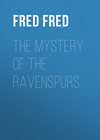Read the book: «The Weight of the Crown», page 11
CHAPTER XXVIII
THE POWER OF THE PRESS
The editorial staff of the Mercury had certainly done their work very well. No detail had been spared to make the report absolutely complete. Everybody was reminded that recently there had been a great deal of friction in that corner of the Balkans known as Asturia. It was well known that for many years Russia had coveted that fair province. Up to now the crown of the King of Asturia had been quite safe. But with the advent of the present monarch things were entirely different. King Erno had very early in his career given evidence that he did not appreciate the full measure of responsibility. He was too fond of gaiety and pleasure; he had no patriotism. His people were a stern, hard-living race, and they did not tolerate the gaiety of the new court.
The queen was all very well, but she was only the consort, after all. It was useless for her to be ever on the spot whilst the king was dissipating his fortune and spending the money ground from his people by extra taxation in London and Paris. And latterly eyes had been turned to Vienna, where dwelt Prince Alix, who was known to covet the throne. At any moment there might be a glaring tragedy, and Prince Alix might find himself with the crown. That Prince Alix was notoriously a friend of Russia mattered little at the present juncture.
Lechmere read all this as he hurried along Fleet Street. He also read a lot of information that was true, and more that was false. Evidently the Mercury people cared for nothing beyond the sensation of the hour. But after all this came the sting of the thing. The King of Asturia had that night gone down to the Mercury office and demanded audience of the editor. He had been very wild and violent, and the intimation that he was hopelessly intoxicated was not very carefully concealed. The king wished it to be understood that he had done with Asturia. He had not the slightest intention of going back to his capital any more. His abdication was signed, and doubtless by that time a deputation was on its way to Vienna to offer the throne to Prince Alix. Altogether, it was perhaps the most sensational report that ever appeared even in an American paper. It was certain to create a great commotion, and set all the courts of Europe by the ears.
"Well, of all the amazing audacity!" Lechmere muttered as he raced along. "Nothing more daring had ever been done in the history of political intrigue. I wonder if Hunt suspects the truth. Not that it would make any difference to him so long as he could shift the responsibility afterwards, as I daresay he will be prepared with proofs that he was justified in what he did. There is only one way to get even with this thing."
Lechmere arrived at length at the office of the Daily Herald. The paper in question had very little taint of the modern spirit about it. There was no chance, for instance, that it would ever be published for less than a penny. The Herald had no very great reputation for enterprise, but it was sound and safe, and everything therein would be accepted as true. No newspaper in the kingdom carried more weight, no journal had a greater reputation for veracity.
The Herald had not gone to press yet. There was no great hurry, seeing that the feverish rush to capture circulation had never commended itself to the paper's proprietors. There was a sense of decorum about the office that had been lacking in the entourage of the Mercury. The place seemed more dignified; there was no noise; all the corridors had felted floors. Even down in the manager's office the same decorum prevailed.
Lechmere knew that he would have no difficulty in seeing the editor of the Herald. In the first place, that gentleman was an old friend of his; indeed, Lechmere had contributed from time to time many articles on foreign politics. Mr. Eveleigh was at liberty, and would see Mr. Lechmere at once. The editor was lying back in an armchair smoking a cigar.
"I have just finished, my dear fellow," he said. "I hope you have something good for me? Nothing wrong? You look actually excited, a most unusual thing for you."
"I certainly have come along at a pretty good pace," Lechmere admitted. "A most extraordinary thing has happened. If this matter is allowed to pass there is no limit to the damage that it may do. Will you be so good as to cast your eye on that, Eveleigh?"
The editor of the Herald took the Mercury in his hand as if he had been contaminated. There was a smile of contempt on his fine face. But the smile faded away, and an interested gleam came into his eyes as he read. He tossed the paper aside at length.
"Nothing very wonderful," he said. "That is precisely how I should have expected the present ruler of Asturia to behave. It's a fine scoop for Hunt, and one after his own heart. He would set the whole of Europe in a blaze to sell an extra fifty thousand papers."
"Why not? He is an American, and his aim is to make money. He has the excuse that he is not bound by any patriotic scruples. Do you believe that story?"
"It certainly has the impress of truth," Eveleigh said thoughtfully. "Hunt dare not hoax his public. The average Briton would never stand it. Besides, that's Hunt's own writing. He is perfectly certain to have taken the statement down from the royal lips."
"No doubt. Probably with the aid of a stenographer. There are no flies on Hunt, to use a pet expression of his own. Let us assume for the sake of argument that Hunt fully believes that he has had the thing from the principal actor in the drama. But all the same, he didn't. The man who dictated that statement was no more King of Asturia than I am."
Eveleigh looked up brightly. Lechmere was not in the habit of making statements that he couldn't prove.
"As a matter of fact, the king has been at Lord Merehaven's all the evening," he went on. "I left him there a little while ago. This thing has been deliberately got up by the gang of conspirators who are working here in the interests of Russia and incidentally for their own pockets. When the proper time comes I will name all these conspirators to you. I can even give you the name of the man who played the part for Hunt's benefit. They chose their people carefully, knowing that only the Mercury out of all the London journals would publish that without first consulting the Foreign Secretary. Don't you see the game? Every paper in Paris and Vienna and St. Petersburg will get a copy of that interview in extenso. It will create a perfect furore in Asturia if the lie is not most promptly contradicted. You see what I mean?"
"In the first place, that some clever actor has been playing the king?" Eveleigh asked.
"Yes. It was Countess Saens's idea in the first place. I am afraid that some of our people inspired her with the suggestion. But that is neither here nor there. That lie has to be scotched, and you are the man to do it. After all said and done, the journalistic English authority abroad is the Herald. Therefore the Herald is going to print that wild story of Hunt's to-night and comment upon the audacity of the scheme. Also, you are going to proclaim the fact that the real King of Asturia was known to be at the residence of the Foreign Secretary, Lord Merehaven, at the time when he was supposed to be betraying his private affairs to the editor of the Mercury. If I were not absolutely certain of my facts I would not ask you to do this, Eveleigh. I want you to make a big thing of this. I want you to assume that Hunt has been hoaxed, and call for the prompt punishment of the criminals. Is there time?"
"Oh, there is plenty of time," Eveleigh said thoughtfully. "No trouble on that score. And I think I can manage it. Sit down for a minute or two while I go and see my chief of staff."
Lechmere sat down fluttering over the pages of the Mercury. His restless eye wandered near the column and along the crowded advertisements. Finally his gaze stopped at the agony column. One line there arrested his attention. It was a jumbled cypher, but the training that Lechmere had had in that kind of thing enabled him to read it almost at a glance.
"I thought so," he said. "I felt absolutely certain of my man. So Peretori is in London! I might have guessed that from the first. Well, it seems to me that I am in a position to hoist these people with their own petard. So long as Peretori is not in earnest, well and good. I wonder if there is a telephone anywhere here?"
There was a telephone at the back of the editor's desk, and Lechmere promptly called up Scotland Yard in search of information. After a pause the information came, which Lechmere carefully jotted down in his pocket book. Eveleigh came back with the air of a busy man.
"I'm going to do it, Lechmere," he said. "No thanks needed: it will be a good thing for us. And now I shall be glad if you will go, as I shall be pretty busy for the next hour. I think you will be safe to leave matters in my hands."
CHAPTER XXIX
IN MAXGREGOR'S CHAMBERS
Whilst Lechmere was making the best of his way from the Herald office to the chambers in the big block occupied by General Maxgregor, he, it will be remembered, lay perfectly still on his bed watching the light broadening under the door of his sitting-room. It was a thrilling moment for both Maxwell and himself.
"What are you going to do?" Maxwell whispered. "Shall I go and see what the fellow is after?"
"No," Maxgregor replied. "Stay where you are. Unless I am greatly mistaken, I know who it is. Our friend is coming in here to investigate."
Surely enough the double doors were opening and the figure walked in. He came boldly enough with the light behind him into the comparative darkness of the bedroom. He fumbled along the wall for the switch, and presently the bedroom also was flooded with light. Mazaroff stood there, his hands apparently covered with pitch, for they were black and sticky, and he was looking round for the washstand.
"If there is anything you want and you don't see it," Maxgregor said coolly "ring the bell."
Mazaroff gave a startled cry. The man was genuinely astonished, of that there could be no doubt. He looked helplessly from Maxgregor to Maxwell and back again.
"I am exceedingly sorry," he stammered. "I – I have come to the wrong rooms."
"Where did you get the key of my suite from?" Maxgregor demanded.
"Who from?" Mazaroff asked helplessly. "Why, from Barlow – Barlow who occupies the suite that I took for this one. You see, Barlow is a friend of mine. Very unfortunate that the key should fit both outer rooms."
"Very," Maxgregor said drily. "When was it that Barlow gave you the key?"
"Yesterday, or the day before?" Mazaroff explained. "You see, he is away from London. As a matter of fact he wanted to let the suite, and I wanted it for a friend. It's very strange that I should find you here like this. I can only tender you my very sincere apologies."
"Better wash your hands before you go," Maxwell suggested grimly. "Were you looking for the basin?"
"That is it," Mazaroff said hurriedly. "You see, I thought I knew my way about the suite, having been so often in Barlow's rooms. I – I slipped getting out of a cab just now and fell on a newly finished piece of asphalte pavement. May I use your basin?"
Maxgregor grimly intimated that the basin was at the disposal of the intruder, who did not cease to pour out floods of apologies. Mazaroff was pretty much at his ease again by this time. He was quite concerned to see Maxgregor looking so pale. Was he suffering from that old malarial fever again?
"Sprained ankle," Maxgregor said sketchily. "Nothing very much to speak of. As a matter of fact, I have never been in better health in my life. It seems to me – "
Maxgregor paused and broke off with a quick sneeze. The thing was ostensibly done, and served very well to hide an exclamation of surprise. For in the sitting-room, with his finger to his lips, Lechmere stood. He shook his head warningly, and pointed to Mazaroff. Then he crossed the room and took his place behind the heavy curtain before the window. No sooner was he secure of his hiding place than he walked out and signified Maxwell to approach the window.
In a casual way Maxwell sauntered into the sitting-room. He first moved the curtain, and appeared to be looking idly into the street below.
"Good boy!" Lechmere whispered approvingly. "What is that fellow doing here? Said he came here in mistake, for a suite of rooms occupied by a man named Barlow? Didn't come here to murder Maxgregor as you might have been inclined to imagine. Well, I quite agree that Mazaroff has made a mistake and shall be able to prove to you why a little later on. I want you to shut the bedroom door for a time till I give you the signal – a tap of the blind on the window – and keep Mazaroff talking. Make him feel at his ease, if possible. Big events are in the air."
Maxwell sauntered back to the bedroom and pulled the door to behind him. Mazaroff was quite himself again by this time, and stood chatting gaily to Maxgregor. It was no part of the latter's policy to let Mazaroff know that he had been nearly done to death at Merehaven House.
"How did you come by that sprained ankle?" he asked. "You seemed all right just an hour or so ago, when I saw you at Merehaven House."
"That's where I did it," Maxgregor lied coolly. He had no scruples whatever in dealing with a man like Mazaroff. "Slipped on a confounded banana skin, which, by the way, is a little more dangerous than orange peel. It's a nuisance just at present, when I am so busy with Asturian affairs and the king is such a handful to hold. I daresay some confounded Russian placed that banana skin for me."
"Don't forget that Prince Mazaroff is a Russian," Maxwell laughed.
"Oh, you need not trouble about me," Mazaroff said in his most fascinating manner. "There are Russians and Russians. I am too enlightened and progressive to feel comfortable in my own country, and that is why I spend so much time in England. So far as I am concerned, you have all my sympathy in your efforts to check the Russian influence in the Balkans. What was that?"
From the sitting-room beyond there came the sounds of somebody gently whistling. The thing was natural enough, and yet Mazaroff listened with a certain suggestion of uneasiness. It came to Maxwell, quick as a flash, that here was something that Mazaroff must not see, for a moment at any rate. Lechmere had charged him distinctly to keep Mazaroff talking for a time.
"My man, I expect," he explained. "I told him to come here about this time, and I suppose he is whistling to let me know that he is handy. When anybody is in trouble, as I am at present, it behoves one to be careful. As one accused of betraying diplomatic secrets – "
"Not at all, my dear fellow," Mazaroff said graciously. "Pray do not apologise. There is a great deal too much fuss made over that kind of thing. The sale of diplomatic secrets is a brisk one in my own country, or how would so many of our poor aristocracy live? And you are innocent, of course. The mere fact that Lancing has made away with himself proves that."
Maxwell turned away so that the speaker should not see his face. It was hard work to keep his hands off the ruffian who was one of the main causes of the trouble. Perhaps Maxgregor divined that, for he hastened to change the conversation. Meanwhile, the whistling in the next room went on…
Lechmere carelessly pulled a section of the curtain aside and looked out. He saw a little man with a clean-shaven face and shrewd eye sitting swinging his legs on the edge of the table and whistling very softly to himself. The little man seemed to be quite at home; he was perfectly cool and collected, save that his face was shining with something that looked like an intense perspiration. He had a small bag with him of which he seemed to be very careful. If he was satisfied with himself, Lechmere grinned with the air of a man who is still more satisfied.
As a matter of fact, Lechmere had discovered all that he desired for the present. He swayed the knot of the blind cord backwards and forwards gently, as if the draught from the open windows was moving it. The knot tapped idly on the panes, and Maxwell's keen ear heard it. The time had come to get rid of Mazaroff. Maxwell opened the door leading into the corridor.
"Excuse me if I ask you to go," he said. "I have some business to settle with Maxgregor, and I have to be on my way to Dover within an hour. It is not very polite of me, but – "
And Maxwell shrugged his shoulders. Mazaroff departed with a graceful apology. He passed along the corridor till he came to the open sitting-room door. He looked in and grabbed for the shoulders of the little man who sat whistling on the table.
"You fool!" he said. "If you only knew how near you have been to betraying everything! But I am to blame as I mistook the room, perhaps because the door was open. Come along at once."
The little man murmured something to the effect that he was ready to do anything for a quiet life, and obediently followed Mazaroff. Lechmere crept from the shadow of the curtain and closed the outer door of the sitting-room. Then he called for Maxwell, who came immediately.
"Is there anything fresh?" he demanded eagerly. "Is there anything that I can do for you?"
"Yes," Lechmere said crisply. "You can do a great deal for me, and you need ask no questions for the present, for I have no time to reply to them. Ask Maxgregor if he has any of his fishing tackle here. If he has, ask him to let me have a long length of salmon line on a reel. The sooner I have it the better I shall be pleased."
"In the bottom drawer of my writing table," Maxgregor called out. "What are you up to now?"
CHAPTER XXX
HER FRIEND, THE QUEEN
Jessie sat listening in a vague way to a girl who sat chatting by her side. She had not the least idea what the girl was saying, nor, indeed, had she any clue to the identity of the speaker. The talk was a little confidential, and was evidently the continuation of some confidence began at another time. Jessie nodded and smiled, and by instinct looked sympathetic at the right moment.
"And what would you say to Reggie under the circumstances?" the girl asked. "It isn't as if George had behaved badly, because he really hasn't, you know. Vera, you are not listening."
Jessie laughed in a dreamy kind of way. The whole thing was getting horribly on her nerves now. She felt how utterly impossible it would be to keep up much longer. She was utterly tired out; she longed for something to inspire her flagging strength. She began to understand why men drink in certain circumstances. But she was just equal to the occasion.
"I am dead tired, I am half asleep," she said. "And my head is racking. Ask me again, my dear, when I am capable of a coherent thought or two. And as to Reggie, why, what can you do better than trust your own woman's instinct. Have I not always thought that – "
But there was no reason for Jessie to prevaricate any further. Relieved at last from her onerous duties, Lady Merehaven was crossing the room. There was no chance of escape so far as Jessie could see, the guests had dwindled down to a comfortable number including the Queen of Asturia. She would have to wait so long as the king chose to play bridge; it would be folly to leave him there. Lady Merehaven came and dropped into a seat by Jessie's side.
"My dear Ada, money is bid for you," she said to the confidential girl. "Your father is positively fussing for you in the hall. He said something about an early excursion on the river to-morrow."
The girl rose with a pleasant little laugh and kissed Jessie. Evidently there was some very clever friend of Vera Galloway's. As she flitted away Lady Merehaven turned to Jessie.
"I have heard the most extraordinary idea suggested to-night," she said. "I understand from your uncle that the idea emanated from Prince Mazaroff. He said that you were not yourself, but somebody else. It sounds very Irish, you know, but there it is. My dear child, how pale you are. Short-sighted as I am, I can see how pale you are."
"I have a dreadful headache," Jessie said unsteadily. "What did the prince mean?"
"Really, I have no idea. I could see that he was very annoyed about something. He told some queer story to the effect that there was a girl in a Bond Street shop who was the very image of you. The only distant branch of our family whose women are remarkably like ours are the Harcourts. But I understand that they have disappeared altogether. It is just possible, of course, that one of the girls might have come down to service in a shop. Have you heard anything of this?"
"I have been told so," Jessie said boldly. "Ronald Hope told me. But why should you trouble?"
"My dear, this is rather a serious business. You heard what happened to Countess Saens. You heard what the countess's maid said. There is no doubt that this girl, who is so very like you, actually committed that robbery. I am going to ask your uncle to enquire into the matter. We shall have the police arresting you for a swindler or something of that kind."
Jessie suppressed a tendency to burst into hysterical laughter. It was fortunate for her that somebody called Lady Merehaven away at this moment, or Jessie's laughter had turned to tears. She crept away through the little room where the bridge players were deep in their game into the conservatory beyond. The king was still playing, and behind his chair was a dark, military looking man with a stern face. It was quite evident that he was on guard over the royal presence. Jessie's mood changed when once she found herself alone. She felt sad and desolate and lonely and utterly beyond her strength. She placed her aching head between her hands and the tears ran down her cheeks.
For a time she wept there quietly. Her eyes were still misty with tears when the noise of rustling skirts attracted her attention. She wiped her face hurriedly, but it was too late to take away all traces of emotion. And as the tears were brushed from the long lashes, Jessie saw the queen before her.
The queen was smiling graciously, but the smile turned to a look of concern. She sat down by the girl's side and slipped an arm round her neck. It was one of the soft, womanly touches that endeared the queen to all who knew her. She was all a woman now.
"What is the matter?" she asked. "I have seen too much trouble in my life not to feel for it in others. And you are so brave and firm as a rule. Let me help you; forget who I am. Let me be as good a friend to you as you have been to me, Vera."
The last word touched Jessie. It seemed horrible to play a part with such a woman as this. And yet the night would have been a bad one for Asturia without the guardian girl from Bond Street. Jessie felt a strong inclination to tell the truth.
"I had better not say, perhaps," she said. "And yet you can help me. There is one thing that I dread – and that is to stay to-night under this roof. Pray don't ask me why, the secret is not all my own. I feel that I dare not stay."
The queen asked no curious questions; there was a phase of temperament here that puzzled her. Very softly she took Jessie's hand in hers and stroked it.
"I know that nervous restlessness," she said. "Who better? But then with me every shadow hides an enemy. Even my friends are enemies sometimes. So you dread staying here to-night. Why?"
"I cannot tell you, madame." Jessie said in a low voice. "And yet if we were elsewhere I might be tempted to speak the truth. Again, I must be out very early in the morning. If you could help me – "
"Help you! Of course I can help you! What is the use of being a queen if I cannot do a little thing like that? One of my women has fallen ill, and I am rather awkwardly situated. If you will come with me to-night you shall take her place. How would that suit you?"
Jessie gasped with pleasure. The whole burden of her trouble seemed to have fallen from her shoulders. She rose to her feet as if anxious to escape at once. A new colour came into her face. The queen smiled, and pulled the girl down into her seat again.
"You are as impetuous and headstrong as you are courageous," she said. "I cannot go yet. There is something still to be done. A message has to be sent to Captain Alexis, the gentleman who you can see from here standing behind the king's chair. It is his duty not to allow his majesty out of his sight. But you need not fear. I shall make everything right with Lady Merehaven."
"If you only knew what a relief it is to me!" Jessie murmured. "I dared not stay here to-night. I should have betrayed everything. And after being so wonderfully successful so far – "
Jessie paused, conscious that she was saying too much. The queen regarded her with astonishment. A look of haughtiness – pride, something like suspicion, too, crossed her handsome, weary face.
"Evidently there is more here than meets the eye," she said coldly. "I have pledged my word, and I am not going to break it now. Possibly you may have a story to tell me presently."
"I will tell you everything if you will only be kind to me," Jessie exclaimed. "Ah, madame, if you only knew what I had gone through and suffered for you to-night – "
"True," the queen said hastily and with a change of tone. "I had forgotten for the moment. Only I hate mysteries. My life has been poisoned by them for years. Stay here and compose yourself, and I will see Lady Merehaven. Then I will send for your maid and give her instructions what to do. Don't stir from here."
Jessie murmured her thanks. She was only too glad to remain where she was and get a little time to think. At any rate, she was free from the dread of having to pass a night at Merehaven House. It was all very well for her to pose as Vera Galloway when dressed for the part and under the shaded lights. But in the strong light of day in her simple night clothing, and with her hair free, it would be a miracle if Vera Galloway's maid did not detect the difference.
Jessie lay back and closed her eyes with a blissful sense of freedom from danger. Surely it would make no difference if she told the queen everything? After all, she had done as much for Asturia as Vera had done, and perhaps more. She had proved her courage and her devotion, and no girl could have done more. Just for a moment Jessie fell into a quiet doze.
She was awakened at length by the entry of a servant, who came with the information that the carriage of the Queen of Asturia was at the door, that her majesty desired to see Miss Galloway. There was a new life and strength in Jessie as she rose to obey the summons.
"Say I am coming at once," she said. "Her majesty is in the hall, I suppose?"















